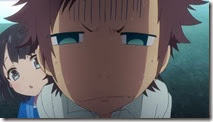 |
 |
 |
When it comes to Okada Mari, context is everything.
There are a very few writers in anime who have the impact of making it nearly impossible to discuss one of their shows without focusing on them specifically – Okada and Gen Urobuchi being two of the most obvious. Maybe that isn’t fair, but it is what it is – and Nagi no Asukara is equally as interesting to me for what it says about Okada as for what it says on its own terms – and I’m quite a fan of the series, in fact. Apart from the fourth and fifth episodes I think it’s been very good indeed, and this ep was no exception.
I’ve spoken in the past about how Okada is like a skilled surgeon who operates with a chainsaw far too often. Put a scalpel in her hand, though (in this metaphor I see the director as having a major influence on the choice of tool) and she can work miracles – miracles like last week’s episode, which was a triumph of Okada’s keen emotional radar and very un-Japanese willingness to have characters openly express those emotions. This one wasn’t on that level – it very much falls under the umbrella of emotional manipulation, but to again repeat myself, when Okada is on her game it doesn’t bother me to have my emotions manipulated as skilfully as they were here.
Why is it that middle schoolers and their issues seem to be such a perfect fit for Okada’s voice? I think what can be overdramatic and irritating with older characters is much more bearable with these barely teenaged kids. She’s chosen to give us a true modern fairy tale here, in the good sense – more than with any original series she’s done for a long time this one is very much a flight of fancy, where she can cut loose and have things be as grand as she wishes and take all the dramatic license she wants in the service of the story. Even AnoHana (the better series, don’t get me wrong) was far more tethered to reality than Nagi no Asukara. Okada’s writing was sharper and more ambitious there – what we’re getting here wouldn’t have worked – but there’s an innocence to this series that I find quite endearing, and which I can’t honestly say I’ve seen in any of her original works.
While I can’t take seriously the notion of Hikari and Miuna as a future couple (and neither can he, judging by the fact that he’s fine walking around in front of her in his beach-blanket boxers) and I think deliberately playing that angle up is the writer indulging her more manipulative instincts too much, I do like the way playing the role of older brother allows Hikari’s character to grow. He was never the beast his detractors painted him as after the first couple of episodes – merely a quite normal 13 year-old – but Hikari’s arc has proved one of the more convincing of the season, especially given that we’re only a third of the way through the series. What I think we’re seeing here is the process of an adolescent learning how to separate his own feelings from what’s right and wrong – a process Chisaki is struggling with, and Manaka hasn’t really begun. What really struck me in his statement of purpose at the beginning of the episode was when he said “I’m not going to give up on Dad.” That’s important, I think – in its way just as important as the idea that he’s going to support Manaka if she decides she wants to live with Tsumugu on the surface, despite still loving her himself.
The subplot with Miuna wanting to pick out a present for Akari is pretty disposable – a cute idea that’s a bit too self-indulgent, goes on for too long and ends with a pretty saccharine moment. But I still enjoyed seeing the dynamic of the six kids going to the big city. I like the little touches like the stores with the “We have salt water” signage – a sign, perhaps, that relations between land and sea aren’t as strained everywhere as they are on the front lines. I liked seeing the very natural awkwardness (as opposed to the awkward scenes in Golden Time, which were awkward because they weren’t natural) between Chisaki and Hikari after he (quite sensitively, I thought) rescued her from the elevator. I haven’t been a big fan of Chisaki, but she did at least confront Hikari about his feelings for Manaka – though they were already pretty obvious, and she didn’t come clean about her own. I do wonder just what Kaname is doing here, though – he’s such an automaton, with his perpetual smile and stubborn refusal to show a hint of personality. At least the sea slug gives us a little nugget of his background every now and then.
As much as this episode was a change-of-pace from last week’s intensity, it appears it will be a brief one. There’s the obvious matter of the saltflake snow falling on land, but also the less obvious issue of Tsugumu’s errand in the city – the one “he can do anytime”. I have no idea what it is but I recognize foreshadowing what it smacks me in the face. Akari and Tooru may want to get the blessing of Itaru and Uroko-sama, but how can they possibly give it when her departure is a crippling blow to a society on the decline? My sense is that the demise of Shioshishio (are there other undersea villages too, that we haven’t seen – is that why a few stores in the city have salt water – and are they in a similar desperate state?) is a one-way street, and that the larger drama will come not from the question of whether it can be prevented, but in the way the cast chooses to deal with the hard truth.
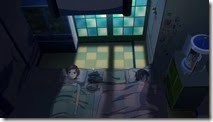 |
 |
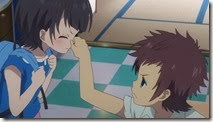 |
 |
 |
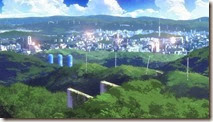 |
 |
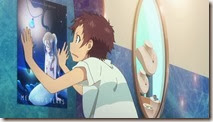 |
 |
 |
 |
 |
 |
 |
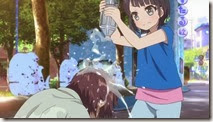 |
 |
 |
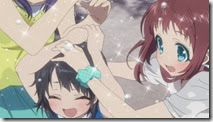 |
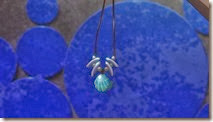 |
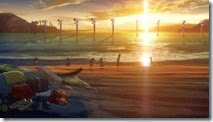 |
 |


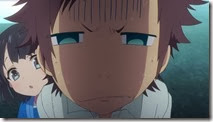
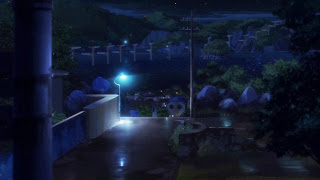
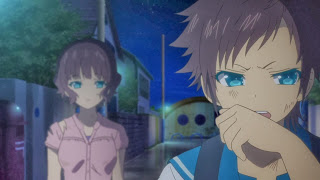
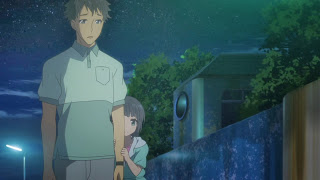
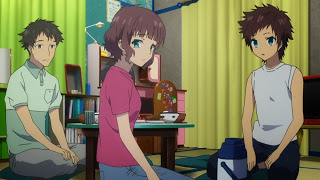
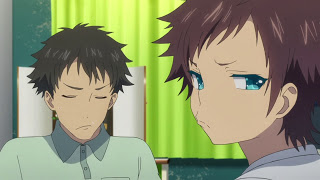
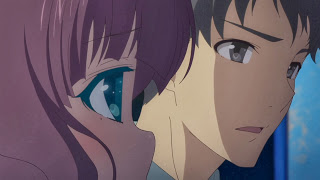


Roger
November 22, 2013 at 2:32 pmthose "saltwater here" signs actually answered a nagging question of mine. so that one pretty much confirms the idea that Shioshisho isn't the only one there is and that they might be other villages. think of it, uroko-sama is said to be just a "scale of the sea god" so i am guessing that these other villages might also be governed by other "scales of the sea god"/
overall i really liked this episode. i don't really find that whole escapade in the city as disposable, as it was able to give a nice insight into the kids' minds.
admin
November 22, 2013 at 2:40 pmI didn't say the trip was disposable – I said the whole buying a present thing as disposable.
Roger
November 22, 2013 at 2:42 pmahh that one. i actually find it cute and it does also give a few insights.
ishruns
November 22, 2013 at 3:56 pmI don't think the decline will be dealt with in a mature or realistic fashion but with some fantastical thinking like Tsumugu is given the power to live in the sea by Urako-sama. It seems more like Okada to do that than write a tale of a tribe's descend.
Overall the episode was standard Okada rather than amazing, a setup for the clash with which the first half of the series will finish with.
Maxulous
November 23, 2013 at 1:07 pm" I think what can be overdramatic and irritating with older characters is much more bearable with these barely teenaged kids."
The younger, the better.